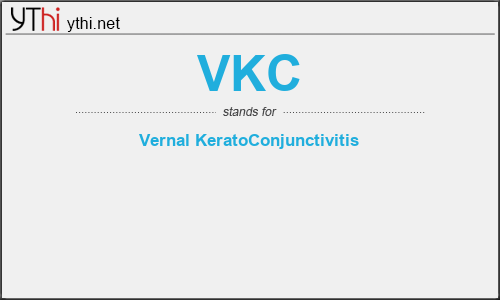What does VKC mean? What is the full form of VKC?
The Full Form of VKC is Vernal KeratoConjunctivitis.
Vernal keratoconjunctivitis (VKC) is an allergic eye disease that especially affects young boys. The most common symptoms are itching, photophobia, burning, and tearing. The most common signs are giant papillae, superficial keratitis, and conjunctival hyperaemia.
Patients with VKC frequently have a family or medical history of atopic diseases, such as asthma, rhinitis, and eczema. However, VKC is not associated with a positive skin test or RAST in 42–47% of patients, confirming that it is not solely an IgE-mediated disease. On the basis of challenge studies as well as immunohistochemical and mediator studies, a Th2-driven mechanism with the involvement of mast cells, eosinophils, and lymphocytes has been suggested. Th2 lymphocytes are responsible for both hyperproduction of IgE (interleukin 4, IL-4) and for differentiation and activation of mast cells (IL-3) and eosinophils (IL-5). Other studies have demonstrated the involvement of neural factors such as substance P and NGF in the pathogenesis of VKC, and the overexpression of oestrogen and progesterone receptors in the conjunctiva of VKC patients has introduced the possible involvement of sex hormones. Thus, the pathogenesis of VKC is probably multifactorial, with the interaction of the immune, nervous, and endocrine systems.
The clinical management of VKC requires a swift diagnosis, correct therapy, and evaluation of the prognosis. The diagnosis is generally based on the signs and symptoms of the disease, but in difficult cases can be aided by conjunctival scraping, demonstrating the presence of infiltrating eosinophils. Therapeutic options are many, in most cases topical, and should be chosen on the basis of the severity of the disease. The most effective drugs, steroids, should however be carefully administered, and only for brief periods, to avoid secondary development of glaucoma.
A 2% solution of cyclosporine in olive oil or in castor oil should be considered as an alternative. The long-term prognosis of patients is generally good; however 6% of patients develop corneal damage, cataract, or glaucoma.
VKC
means
Vernal KeratoConjunctivitis![]()
Translate Vernal KeratoConjunctivitis to other language.


Leave a Reply
You must be logged in to post a comment.